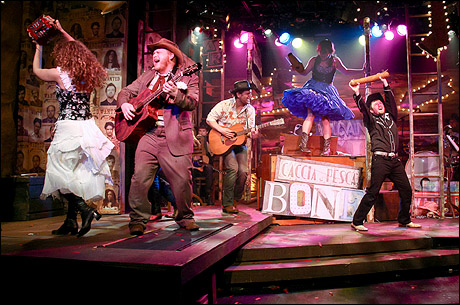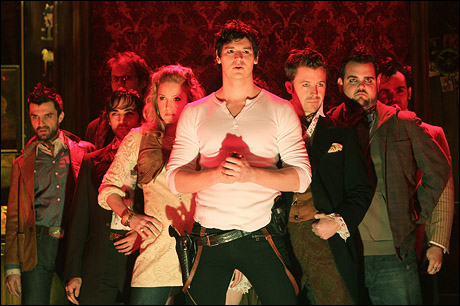
The cast of Bloodsong of Love are rocking out, or something.
Two nights in a row last week, I saw new musicals with Blood in their title: Bloodsong of Love and Bloody Bloody Andrew Jackson. Apparently, the hot new thing on Broadway is to stick blood in the title of your show and throw some reddish liquid approximation of the bodily fluid at your characters (or, in the case of Bloodsong, at your audience as well).
Unfortunately all blood is not created equal. And I’m not just talking about the fact that the fake-blood used in one show made for a better substitute than it did in the other, though that was definitely also true. No. I mean just because you put the word blood in your title and stuck your tongue in your cheek, doesn’t mean your show is going to be successful. Shocking, I know. It seems like such fertile ground, with no room for artistic misstep at all.
But missteps there were, and seeing Bloodsong of Love and Bloody Bloody Andrew Jackson back to back definitely underscored them.
I started to sense that seeing Bloody Bloody Andrew Jackson again was going to make Bloodsong of Love look real bad by comparison, when, upon leaving Ars Nova, Lucky and I spent exactly two seconds talking about Bloodsong and its hot leading man—Eric William Morris—before conversation turned, again, to Hair and Will Swenson and Priscilla Queen of the Desert. We never really got back to talking about Bloodsong that night, either.
In fact, we didn’t get back to talking about it until the next night, and by that point, there was no question. Where Bloody Bloody Andrew Jackson was the kind of show that made me want to see it compulsively—to circle right back around and return to my seat for another showing—Bloodsong of Love just made me glad my tickets were only $25.
Bloodsong just lacked…blood. Metaphorically, I mean— there was definitely no lack of the fake fluid flying around that stage—there was something missing just under the surface. I enjoyed myself, sure. But I didn’t leave the theater mourning the fact that I wouldn’t be able to see the show again before it closed on May 9th. And I definitely didn’t laugh as hard as I had hoped to. Or even as hard as about 50% of the other audience members seemed to be laughing. (Were they Joe Iconis’ friends? Lucky and I later wondered. Or maybe they were just friends with that Banana guy.)
Bloodsong simply never took off, mostly because the writing just wasn’t good enough. There, I said it. The show came so close to liftoff so many times, but it just never happened. The actors were terrific and they worked hard, the physical comedy was consistently funny and the direction was great, but the rest of the show just didn’t live up to expectations. I don’t know if it was a fear of misinterpretation, a lack of trust in his future audience, or just plain lack of skill (gosh, I hope not), but Joe Iconis’ book and lyrics fell short. And I mean that literally. Because Bloody Bloody showed us the distances you have to go in order to make this whole musical as tongue-in-cheek satire thing work. They’re quite far, those distances. And you have to travel them in an all out, balls-to-the-wall kind of fashion.
Satire requires complete faith in both the joke and your audience, and 100% commitment. You cannot hesitate. You cannot try and explain it. You have to make the joke flippantly—tongue always, always, always firmly in cheek—and trust that it will land, even when it’s obscure. And you can never falter from your conviction (ironic, as that’s sort of the theme of Bloodsong). Writing satire is absolutely terrifying, because you’re going so far afield that it’s impossible to be sure how it will be taken. It seemed to me, as an audience member, that Joe Iconis let his fear get the better of him. He tried to hold our hands by balancing a kooky, jokey book with earnest, heartfelt lyrics, and in doing so he made both the book and the lyrics look kind of stupid. In Bloody Bloody Alex Timbers and Michael Friedman attempted no balance at all, offered no apology or explanation, and that’s why it worked.
Perhaps part of what allowed Timbers and Friedman the opportunity to be so damn crazy, so unapologetic, was the source material. Andrew Jackson’s life is surprisingly fertile ground for a show, partly because (unless you’re a history buff) you remember exactly one thing about him: the Trail of Tears. Oh, and that he was the President. That leaves a lot of fresh material that can be presented to us, as an audience, in any number of ways. Spaghetti Westerns…even if you’ve never seen one, you know what they are. They form such a specific, controlled genre that even when you’re parodying that, as a writer, you are extremely limited.
Maybe it’s also our collective memory as an audience. The source of the humor in Bloody Bloody is so fresh—politics and emo-dominated airwaves—that we haven’t forgotten what’s being poked at. And no one thinks we need any kind of reminder. But with spaghetti westerns, Bloodsong’s humor isn’t quite so present. It’s not making fun of your life today, or the music you listen to, its making fun a genre of film you’ve probably never seen. And in an attempt to make things clear to you, the audience, Joe Iconis’ jokes turn out so heavy they beat you painfully over the head when they land.
And maybe, at the end of the day, I just preferred Bloody Bloody Andrew Jackson because Benjamin Walker leapt out into the audience, straddled my lap, and literally rubbed his (stimulus) package all over my body, while the handsome leading man in Bloodsong of Love never came anywhere near me. Silly and shallow though it may sound, I think that’s actually the whole point, right there, in a nutshell. Because in that moment Bloody Bloody Andrew Jackson and its leading man proved that in pursuit of great satire—great theater—they were willing to go completely, well, balls to the wall unsuspecting female audience member’s chest.

It takes serious commitment to rub up on a girl in those pants.
Photo Credit: Peter James Zielinski; Joan Marcus.


{ 0 comments… add one }